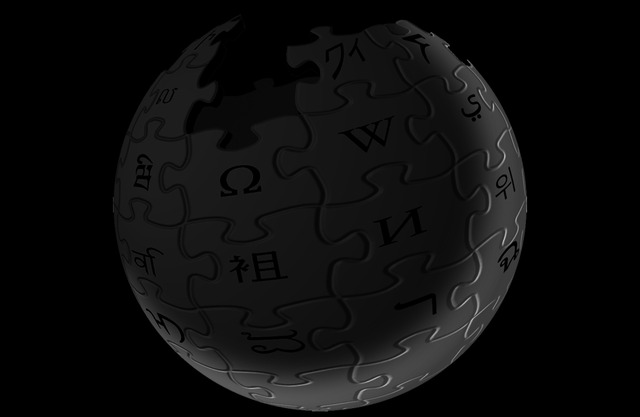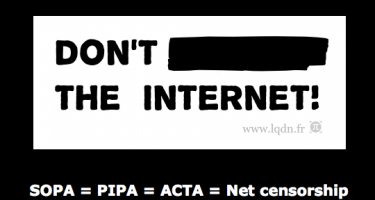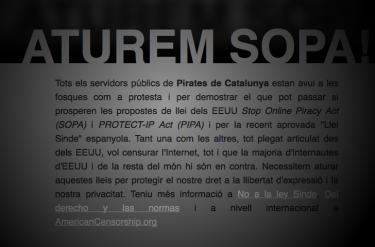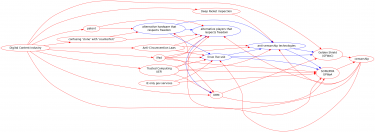January 18 was an important day for the Internet. Corporate websites, from Google to Twitpic, along with civil society groups and individuals, have all joined together in a common cause: to protest two American bills that could have grave effects for global online free expression.
As Global Voices’ Executive Director Ivan Sigal has written, “there are powerful corporate and government forces who would prefer to see the openness and accessibility of the web restricted.” The Stop Online Piracy Act (SOPA) and the Protect-IP Act (PIPA) would both force websites to pro-actively censor potentially copyrighted information, and could, as Sigal wrote, “inflict broad damage on the work of digital activists living under repressive regimes, as well as restrict basic speech freedoms around the world.”
Because these bills have the potential to affect Internet users worldwide, members of the global community have joined Americans in protest. From German digital rights group Netzpolitik to Open Media Canada to individual bloggers and social media users, the sentiment is the same: Stop these bills.
Blacking out
Many sites have chosen to express their opposition by blacking out their sites, either entirely or with an interstitial page. Danica Radovanovic (@DanicaR), writing for Australian blog network DejanSEO, discusses Wikipedia’s decision to join the blackout, a decision that affects the site’s diverse global community:
Over the course of the past 72 hours, over 1800 Wikipedians have joined together to discuss proposed actions that the community might wish to take against SOPA and PIPA. This is by far the largest level of participation in a community discussion ever seen on Wikipedia, which illustrates the level of concern that Wikipedians feel about this proposed legislation. The overwhelming majority of participants support community action to encourage greater public action in response to these two bills. Of the proposals considered by Wikipedians, those that would result in a “blackout” of the English Wikipedia, in concert with similar blackouts on other websites opposed to SOPA and PIPA, received the strongest support.
French organization La Quadrature du Net has joined its American counterparts in blacking out its website, displaying the following image:
Pirate parties are among the most stringent opponents of the anti-piracy bills. In Spain, Catalunya, Switzerland, Argentina, Canada, and Sweden (among, almost certainly, many others), local pirate parties have joined in blacking out their websites.
Also blacking out for January 18 are Germany’s Chaos Computer Club and Green Party, and international organization Reporters Without Borders. The latter explained its decision, writing:
We have decided to close our English-language website for 24 hours to symbolize the oppressive gag that would spread over the Internet as we know it if SOPA and PIPA are adopted. These bills would affect an incalculable number of Internet users who are innocent of any kind of intellectual property violation by forcing websites to block access to other sites suspected of vaguely-defined copyright breaches.
For more images of sites blacking out in protest, check out Netzpolitik’s SOPA blackout gallery.
Translating the importance of activism
In some countries, bloggers have taken it upon themselves to educate their communities about the importance of opposing SOPA and PIPA. Lebanese blogger Mireille Raad has written an explanation for why Lebanese citizens should care about these bills. She writes:
Being a lebanese, doesn’t stop you from being an internet user – the SOPA will affect the internet in a bad way and it involves websites outside the US, and that’s yours…
…You should care and be pissed of, because, like it or not, the internet doesn’t exist in the clouds, it is made of companies that exist in countries and have to answer to local laws despite the fact that internet is “global”. This fact is making people worldwide care about the SOPA legislation – and even though you may feel powerless, you still should care and take online action – because all citizens in cyberspace are created equal and so their actions resonate equally
An earlier post Taiwanese freedom of information activist CK Hung dubs the anti-piracy bills “The Great Firewall of Chinamerica.” In a graphic [zh], the blogger demonstrates his point:
Edit: An English version of the graphic is also available:
He also writes:
掌權者很樂意用 「保護智財」 或 「阻絕色情」、 「和諧社會」 當做永遠不可能吃到口的誘餌來說服公民支持其強化管制網路的法律和政策 (例如選擇便利管制的工具), 然後藉由這些法律和政策來強化它對公民的資訊監控。 掌權者很樂意公民只看見海市蜃樓, 卻忽略通往海市蜃樓的道路上, 威脅著社會自由民主的 collateral damages。 不論最終的掌權者到底是微軟、 蘋果、 共產黨、 民主黨、 還是共和黨, 受害的永遠都是絕大多數的公民。
而臺灣, 正是這兩大監控勢力交會處的絕佳實驗場所。
Global Voices’ own Venezuelan contributor Marianne Diaz explains why she doesn’t like the bills [es]:
De cualquier modo, Estados Unidos no es el mundo, y las leyes de propiedad intelectual tienen limitaciones territoriales y varían de país a país. Por ejemplo, en Venezuela, la obra entra en dominio público sesenta años después de la muerte del autor. Sin embargo, mediante la aplicación de SOPA y PIPA, Estados Unidos pretende que a mí, a ti y a cualquier siberiano se le pueda forzar a cumplir unas limitaciones que no le son aplicables de acuerdo a la ley.
On Twitter, similar conversations are happening. From the UK, @GokhanKaratay writes:
I really do hope #SOPA and #PIPA bills aren’t passed through the senate. Legislation against piracy is needed, but that really isn’t the way
Pointing out the participation of Argentine video platform Cuevana, @Gaby_xoa points out:
#Cuevana uniéndose al apagón #ANTISOPA que cuarta la libre expresión!!! twitpic.com/88nzkg
What you can do to stop SOPA and PIPA
 Although the international community is limited in how they can affect an American bill, the solidarity expressed in opposition to both bills is certainly helpful to U.S.-based activists. Aside from the aforementioned examples, bloggers have found numerous creative ways to do so, such as adding an anti-SOPA or anti-PIPA Twibbon or blacking out their WordPress blog. Fight for the Future is encouraging the international community to sign a petition to the State Department. But just writing about the implications of the two bills can help.
Although the international community is limited in how they can affect an American bill, the solidarity expressed in opposition to both bills is certainly helpful to U.S.-based activists. Aside from the aforementioned examples, bloggers have found numerous creative ways to do so, such as adding an anti-SOPA or anti-PIPA Twibbon or blacking out their WordPress blog. Fight for the Future is encouraging the international community to sign a petition to the State Department. But just writing about the implications of the two bills can help.
American citizens, on the other hand, have plenty of options. Here are just a few ways to get involved:
- The Electronic Frontier Foundation has a petition as well as a guide to meeting with representatives.
- Fight for the Future’s Stop American Censorship project is hosting a letter-writing campaign.
- Free Press has a campaign to petition television networks to report on the bills.































Comments